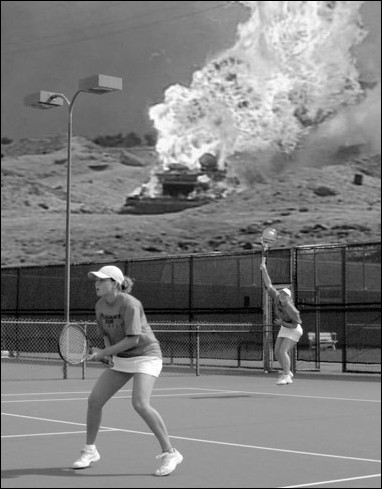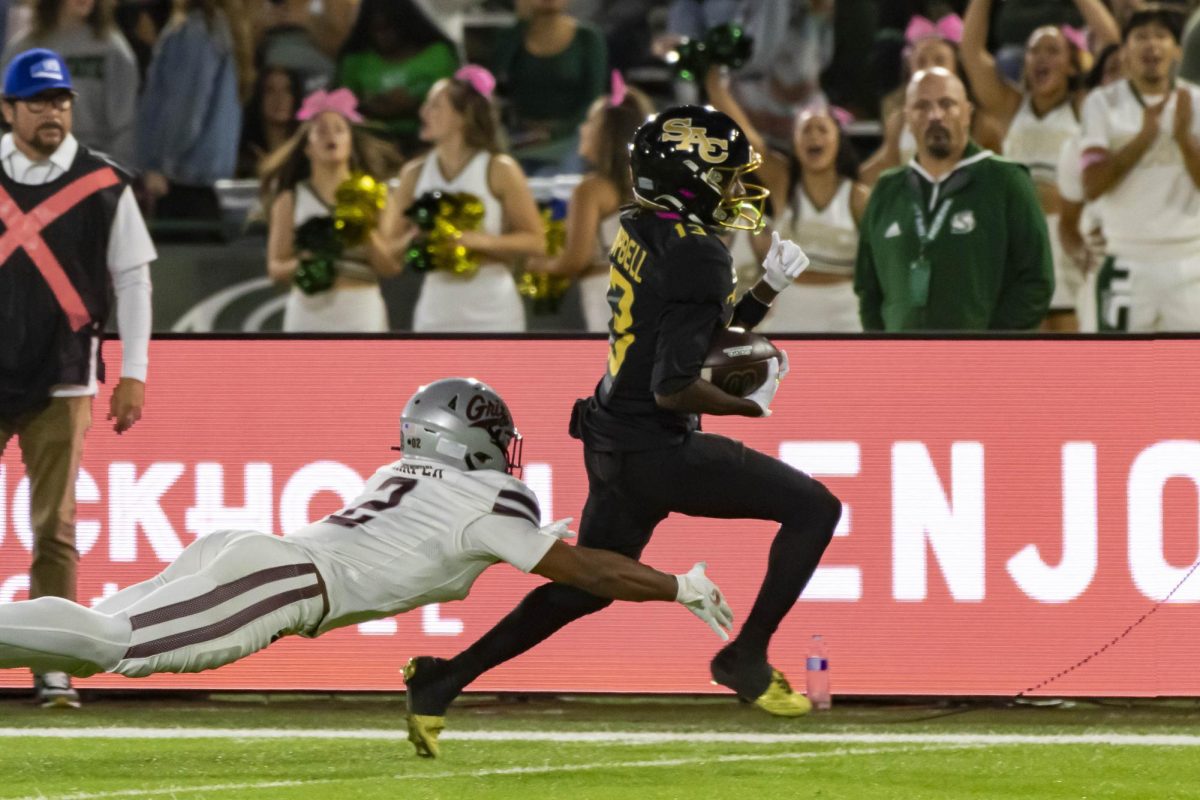The games must go on

Image: The games must go on:Despite the turmoil overseas, American sporting events, including Sac State’s women’s tennis match against the University of Washington on sunday, carry on.Photo Illustration by Cody frostPhoto by Katie JohnsonState Hornet:
March 26, 2003
The best thing about the sports page is that it’s the one section of the newspaper where all the other sections intersect and jostle for position.
The sports section is more than just endless lines of stats and action verbs — it’s entertainment bumping up against business; national news trading elbows with local coverage; advertisement staring down editorial; and, yes, politics sitting at the end of the bench, rarely used but always explosive.
War, on the other hand, does funny things to sportswriters. Single minded jock worshippers/biographers suddenly develop quivering upper lips for fluttering flags and patriotic ceremonies, and a curious and unnecessary penchant for flagellating the world of sports.
Suddenly, sports are unimportant. Golden-god athletes pale next to the unsung “real heroes.” The games themselves become mere trifles, childish dribbling disrespectful to our fighting boys and their families, and above all, utterly meaningless next to the grand spectre of history writing itself.
As war raged in Iraq this week, many sportswriters and pundits — as well as some athletes and coaches — called for the sporting world to step away from the spotlight, to take a backseat to “real world” events by canceling or postponing their games.
And just as anyone who picked the Clippers to reach the postseason, those pundits were laughably wrong from the very beginning.
At such a chaotic, morally ambiguous moment in the world, when the Earth seems to be spinning off the edge of sanity, sports couldn’t be more important.
Sports, at their purest, are the only place in the world that present a level playing field to all competitors, regardless of race or nationality. They provide an impartial and unyielding set of rules, boundaries outlined in chalk and paint, and a winner crowned without bloodshed — unless, of course, Ron Artest is playing.
And what about our American soldiers fighting overseas? I’m not a member of the military and I’ve never known the horrors of war, but wouldn’t hearing their hometown box scores provide more comfort and incentive than symbolically shutting the games down? Aren’t these symbolic displays of support and respect really targeted toward those of us on the homefront anyway?
This much I know for sure — there is not one single American soldier fighting in this campaign who filled out an NCAA tournament bracket for “symbolic displays of patriotism.” More likely, they picked Kentucky.
Like most of America, I’ve watched images of Tomahawks taking off and bombs bursting over Baghdad throughout the week. I’ve seen pictures of American soldiers praying one moment, waving handguns in the air the next.
Through it all, it occurred to me how little Thursday’s Gonzaga-Cincinnati opening round matchup affected what was happening in a desert ten thousand miles away. There is something to be said for the comfort of “normalcy”– as the world crept closer to apocalypse, it sure made me feel better to watch a good game of basketball.
So far, most sporting events have gone on as planned, albeit with heads hung low and with endless, rote acknowledgments that the significance of war dwarfs the importance of swinging a stick or putting a ball in a hole.
The NCAA Tournament and the NBA and NHL played their games as scheduled, although Major League Baseball cancelled Oakland and Seattle’s goodwill season-opening series in Japan, citing fears of traveling overseas in a time of military conflict.
Many writers invoked the spectre of the Sept. 11 shutdown to rationalize canceling sporting events throughout the nation — in the wake of the attacks on New York and Washington, D.C., every athletic game from the opening week of the NFL to Indiana high school soccer was pushed back about a week.
Similarly, the 1989 Loma Prieta earthquake forced the postponement of the Bay Bridge World Series, amid many pleas to cancel the games altogether.
The situation in Iraq, however, is hardly comparable to Sept. 11 or the World Series earthquake — those were sudden, unexpectedly tragic events that left the country dazed and shaken.
In contrast, Operation Iraqi Freedom is practically a pre-sold television event — the war drum has been beating for about a year now. Last fall, an American war in Iraq had become as unexpected as a Darryl Strawberry drug bust.
Besides, anyone who gets misty for the inflated pomp and pre-fab patriotism that greeted the sports world’s return following Sept. 11, forgets how they, like many car dealers and souvenir outlets, shamelessly exploited the patriotic neuroses of the time.
Perhaps buoyed by too many late-night screenings of “Black Sunday,” sports facilities across the nation bowed to paranoid imaginations of a terrorist threat, by banning most bags and coolers, which not coincidentally sent concession sales skyrocketing. Meanwhile, stadiums beefed up security, and controversial security cameras and searches became the norm.
Who knows how badly the sporting experience would be mutilated if the games went away again?
The best way to preserve the waning purity of sports is to simply play ball.
Click here to send private feedback about this article to the State Hornet’s Sports staff.



























































































































